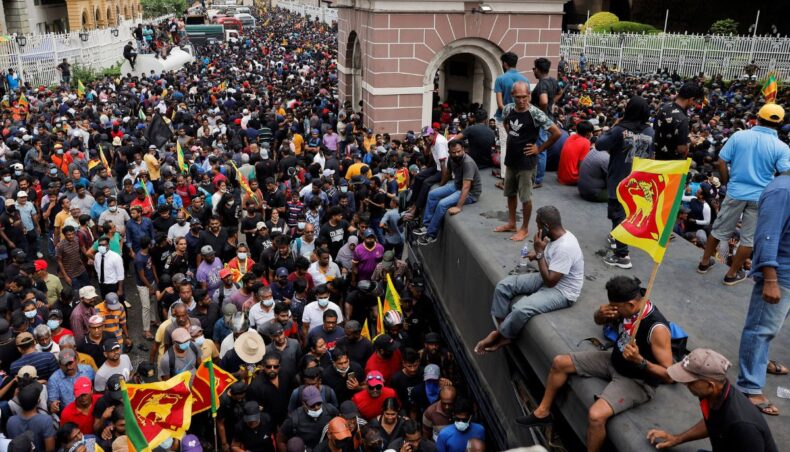Early on Friday, Sri Lanka security personnel attacked and largely evicted a protest camp that had taken up residence on government property in Colombo, adding fuel to the fire that fears President Ranil Wickremesinghe had begun a crackdown the day after taking office.

In riot gear and brandishing assault guns, soldiers were shown in media footage ripping down the camp, erected in April by demonstrators furious over the nation’s economic collapse and severe shortages of food, fuel, and medication.
Wickremesinghe, a six-time prime minister, was sworn in as president on Thursday after winning a vote in parliament to replace Gotabaya Rajapaksa, who left the country for Singapore last week following widespread public demonstrations sparked by the worst economic crisis the Sri Lanka nation has experienced in seven decades. View More
Since Wickremesinghe, the Sri Lanka acting president declared a state of emergency on Monday and many saw him as Rajapaksa’s buddy, protesters had worried that a crackdown was about to begin.
Previous emergency measures have been used to restrict the right to protest and grant the military the authority to detain demonstrators.
A UN representative, as well as western envoys, encouraged the government to take moderation, warning that using force may further destabilize the island nation’s economy, which is in dire need of a bailout from the IMF after almost running out of cash to pay for essential imports.
‘Right to Peaceful Assembly’
The United Nations resident coordinator in Sri Lanka, Hanaa Singer-Hamdy, stated that “actions that restrict protests and the right to peaceful assembly can deepen economic and political instability in Sri Lanka.”
Julie Chung, the American ambassador to Sri Lanka, tweeted, “we encourage restraint by authorities and rapid access to medical care for those harmed.”
Dinesh Gunawardena, a veteran legislator, and another Rajapaksa friend was sworn in as the country’s new prime minister just hours after security troops attacked the protest camp.
The remaining 17 ministers made up the full cabinet; Wickremesinghe would continue to hold the finance ministry, while previous finance minister Ali Sabry was appointed foreign minister.
Military officers in uniform sat on one side of the room as Wickremesinghe, MPs, and other leaders listened to Gunawardena be sworn in at the prime minister’s office.
Nine people were detained after the raid on the protest camp, according to earlier police reports.
“No legal right”
Police spokesperson Nalin Thalduwa told Reuters that “a coordinated operation combining the military, police, and police special forces were initiated in the early hours to retake the presidential secretariat from the demonstrators as they have no legal right to hold it.”
Hundreds of protestors marched from the city’s major railway station towards the Galle Face demonstration site after becoming incensed by the dawn raids, but they were stopped by military and riot police manning barriers.
“This is the face of Ranil Wickremesinghe,” declared Rajeevkanth Rajkumar, a construction firm executive who was among the demonstrators. “The very first day he employed the military forces.” “We don’t want any more defenseless individuals hurt. But we’re going to the protest site at all costs.”
Anura Kumara Dissanayake, an opposition leader who was unsuccessful in winning the presidential election, wrote on Twitter: “Let’s bring down the brutal… administration that viciously beat the demonstrators at Galle Face.”
The organizers reported that at least 50 demonstrators, including some journalists who were physically assaulted by security personnel, were hurt during the violence. Two were hospitalized, according to hospital sources.
Buddhika Abeyrathne, 34, a demonstrator who saw the raid but didn’t appear to be hurt, said, “They hit us pretty mercilessly.” “Mr. Wickremesinghe is ignorant of democracy.”













